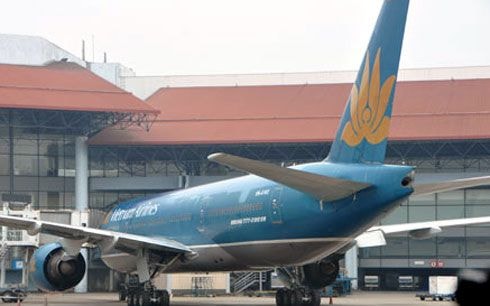Vietnam Airlines wants to include environmental tax in ticket prices
Increased environmental fees could cause airlines to incur additional expenses of hundreds of billions of dong each year, a Vietnam Airlines representative said.
Many airlines said they lost hundreds of billions of dong when environmental tax on gasoline tripled from May 1, so they proposed to eliminate this tax or include it in ticket prices.
Vietnam Airlines Deputy General Director Duong Tri Thanh raised the issue of increasing environmental tax on gasoline at a recent conference on the difficulties of the aviation industry.
According to Mr. Thanh, the cooling of world oil prices helped ease the difficulties of the aviation industry. However, when the price dropped to 62 USD per barrel, the import tax immediately increased to 25% at the end of 2014. When the fuel price increased to 75 USD last March, the tax was not adjusted in time.
 |
Business will become even more difficult when the environmental tax on gasoline will increase from the current VND1,000 per liter to VND3,000 from May 1. According to the estimate of a representative of Vietnam Airlines, the impact of the increase in environmental fees on the airline is VND750 billion, on Jetstar Pacific is VND150 billion and on Vietjet Air is VND350 to VND400 billion.
"Aviation is an industry with low economic efficiency. Even with Vietjet Air, the company announced it was profitable, but I think it is still very difficult," said Mr. Duong Tri Thanh. For this reason, the Deputy General Director of Vietnam Airlines proposed that the Civil Aviation Authority and the Ministry of Transport recommend that the Government consult with the Ministry of Finance to make appropriate adjustments. He suggested that environmental tax could be considered an additional revenue and included in the ticket price directly imposed on passengers.
Agreeing with Vietnam Airlines, in his petition, Jetstar Pacific representative said that fuel taxes and fees in general and environmental taxes in particular are causing difficulties for airlines. Mr. Ta Huu Thanh, Deputy General Director of Jetstar Pacific, proposed that the Civil Aviation Authority and the Ministry of Transport have a say in maintaining the tax on jet fuel at 7%. Regarding environmental taxes, Jetstar Pacific proposed that they not be applied to airlines.
Besides financial recommendations, airline representatives also mentioned many difficulties they are facing regarding airport infrastructure and flight management.
Regarding infrastructure, congestion at major airports is becoming increasingly serious. A representative of Vietnam Airlines said that not only during Tet peak season, during normal times at Tan Son Nhat airport, planes have to spend half an hour taxiing in and out. At smaller airports, many airlines complained about inappropriate space arrangements.
VASCO representatives recommended that Ca Mau and Rach Gia airports should rearrange the food stalls and restaurants to avoid spoiling the overall beauty. During peak tourist season at Cam Ranh airport, the number of passengers increases 3 times more than usual, causing overload. If the airport does not employ more seasonal workers, it will not be able to handle the demand.
Flight management capacity is also a problem for many airlines. Vietnam Airlines' report said that during the recent Tet peak, many of its flights were delayed because air traffic controllers operated longer routes than planned. Specifically, during the Tet peak period from February 15 to 23, the airline had 540 delayed flights at three airports: Noi Bai, Da Nang and Tan Son Nhat. Of these, 67.1% of the delayed flights to Tan Son Nhat were due to air traffic control. The rate at Noi Bai was also high at 41.4%. For this reason, the airline's flights were delayed by an average of 17 to 20 minutes./.
According to vov.vn






